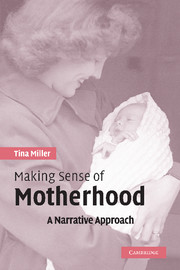Book contents
- Frontmatter
- Contents
- Dedication
- Acknowledgements
- Introduction
- 1 The storied human life: a narrative approach
- 2 Making sense of motherhood: cultural scripts
- 3 Setting the Western context: mothering in late-modern society
- 4 Anticipating motherhood: the antenatal period
- 5 Making sense of early mothering experiences
- 6 A return to normal: becoming the expert
- 7 Conclusions and reflections: making sense of motherhood
- References
- Index
4 - Anticipating motherhood: the antenatal period
Published online by Cambridge University Press: 22 September 2009
- Frontmatter
- Contents
- Dedication
- Acknowledgements
- Introduction
- 1 The storied human life: a narrative approach
- 2 Making sense of motherhood: cultural scripts
- 3 Setting the Western context: mothering in late-modern society
- 4 Anticipating motherhood: the antenatal period
- 5 Making sense of early mothering experiences
- 6 A return to normal: becoming the expert
- 7 Conclusions and reflections: making sense of motherhood
- References
- Index
Summary
They've always done all the checks all the time so I'm quite confident that everything's been monitored.
(Clare, antenatal interview)Transition to motherhood involves women embarking on uncertain personal journeys: anticipating the birth of a baby, becoming and being a mother, motherhood. The previous three chapters have helped to set the scene conceptually, theoretically and methodologically. The following three chapters shift the focus to women's own lived, embodied, ‘fleshy’ accounts of their experiences of becoming mothers for the first time. The arguments set up in the previous chapters are now revisited in the light of the experiences of the women in this group. How far are features of late modernity – uncertainty and risk, trust in expert bodies of knowledge, and reflexivity – discernible in the accounts produced? In what ways do these features shape the ways women talk about their experiences? For example, how do cultural constructions of risk translate into responsibilities and actions? What can a detailed focus on this period of transition tell us about the ways in which selves are experienced, maintained and narrated? How is reflexivity experienced and played out? As noted in the previous chapter, notions of normal and good and bad mothering permeate the contemporary context in which transition to motherhood is experienced and understood within the Western world. This extends to the antenatal/prenatal period, in which appropriate ways of preparing to become a mother are culturally and socially shaped and experienced.
- Type
- Chapter
- Information
- Making Sense of MotherhoodA Narrative Approach, pp. 66 - 88Publisher: Cambridge University PressPrint publication year: 2005



